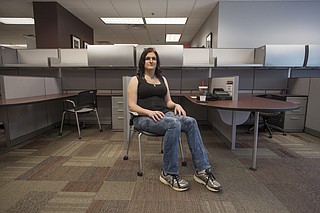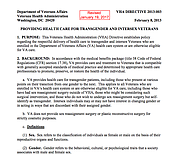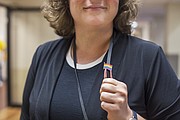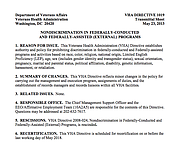Wednesday, June 21, 2017
Kara Stanford is a transgender Iraq War veteran who is majoring in social work at Mississippi State University. It is easier to go without health care most of the time because accessing it is so difficult, Stanford says. Photo by Imani Khayyam.
It was nap time at Oak Forest Elementary School in Jackson. Kara Stanford, then 7, saw her chance when the teacher looked away, preoccupied with something else. The child sneaked to the other side of the classroom and pulled on a little sequined ballet dress from a pile of dress-up clothes in the classroom. Stanford managed to get the dress on, but a classmate soon noticed and alerted the rest of the class. The teacher grabbed her camcorder, Stanford recalls, as the little boy in the sequined dress sought refuge from embarrassment in a classroom closet.
Stanford was male at birth and had a different name when that incident happened. Still, that was the day that she "came out of the closet," both literally and unintentionally.
The child tried to hold the door shut, but the teacher pried the door open. Stanford remembers the light on the camcorder, as her teacher pulled her out of the closet "kicking and screaming." The teacher forced Stanford to dance for the other kids, with them pointing and laughing.
Forced into hiding, Stanford buried what she would later learn to be her gender identity as a transgender female. After the kindergarten outing, Stanford says she turned into a shy, violent little kid.
"When you force someone into hiding for more than a decade, they're not going to be a well-adjusted person," she told the Jackson Free Press recently.
Stanford's family is Mormon, and eventually her parents home-schooled her from third grade until she turned 17 years old. Stanford only found out a few years ago that her mother had talked to some Christian counselors about her during her childhood. They told her mother it was just a phase, and Stanford's mother never took her to see a counselor. Both of her parents were in the military—she was actually born in Wiesbaden, Germany—so it wasn't unusual when Stanford enlisted in the U.S. Army Infantry at the age of 17 with her parents' permission in 2002.
In Iraq, Still Hiding
When Stanford joined the military, she still had the same thoughts she did when she was 7 but had no terminology to explain it. Stanford said even her social interactions were separated by sex growing up, so she could not play with other girls besides her sister. Raised in a conservative religious home in Mississippi, Stanford had no exposure to other transgender men or women. She thought she was the only one.
"As far as figuring out what's up, we collect the wigs, the makeup, the prosthetics, all that and go through this cycle of dressing and hating ourselves and throwing it all away, and I went through a few of those," Stanford said. "Even deployed in Iraq, I would sneak into a Port-o-John in 103-degree weather and shave my legs. ... I knew something was up, but I didn't have a word for it—I just thought I was crazy."
Stanford did basic training in Georgia and eventually was deployed to Iraq in 2004 for over a year.
"By that point, I had been wearing my mask since I didn't come out for a long time, and that kind of eats at you," Stanford said. "I wanted to go some place where I could kick in doors, blow shit up ... so I went infantry."
Combat waited for Stanford and her I-155 Infantry Battalion at the Forward Operating Base in Iskandariyah, which was called FOB Chosin for short. It was only a year after the U.S. had invaded Iraq that Stanford touched down on Iraqi soil. As infantry, she was on the front lines, hunting down terrorist insurgents in raids.
Stanford recalls one raid that seemed like a laser-tag game, when she and her comrades used infrared lasers to look for two reportedly guilty targets on the run in a forest, near the river.
While an Apache helicopter whirred overhead ready to shoot, Stanford and her comrades worked to find the two men. When their laser-like pointers located the men, they signaled the helicopter above, which had a nose gun ready to fire.
"We found them," Stanford said, implying that both targets were killed.
Stanford said it was common for people to get shot during raids, and she got lucky, leaving her first tour with no gun wounds.
Stanford came home with a combat infantry badge in 2005 and enrolled in the Mississippi National Guard. She worked odd jobs around Jackson, where her family still lived, but struggled to stay in the state. She still didn't know the word "transgender" and had not come out to her friends and family. She moved to Michigan, taking a first stab at college at Kettering University. She was there a year and a half and then deployed to Iraq again in 2010.
This time, Stanford said, she didn't see combat. Instead, she dealt with more political conflicts, like officers exaggerating about what they did to get more honors at home. She was medically discharged for "behavioral health" after a nervous breakdown, but her discharge was fully honorable, meaning she got to keep her benefits.
The second fight for medical care and equal treatment waited for Stanford at home, however—one that continues to be a fight for many LGBT veterans around the country and in Mississippi, specifically.
Services for LGBT Veterans?
When Stanford got back from Iraq in 2011, she returned to Michigan, and it was during this time that she came across the word "transgender" on the Internet. She had never heard it before. She says that while something in her clicked, it still took a few years to process what that meant.
Stanford moved to Hawaii to work at a brewery there, doing computer IT work as well as working as an assistant brew-master when she was first encountered other transgender people.
"That was my first exposure to 'Oh my God, other transgender people exist,' because in Hawaii nobody gives a shit—nobody bothers each other like that," Stanford said. "I saw two 400-pound Samoan men making out at a Jamba Juice, and nobody cared. That was like my first (realization that), 'Hey, there are places I could be where people would just let me be me."
When the brewery tanked and Stanford was forced to come back to Mississippi, she felt confident enough to start taking hormones and begin transitioning. She wanted support, however, and found very little at the Veterans Administration. She didn't know that the VA would cover the cost for hormones, so she paid out of pocket for them. She had taken hormones for half a year before officially coming out to her friends and family.
The VA does cover hormone treatment for transgender veterans but does not cover the cost of gender-affirming surgery. Stanford had to pay out of pocket for her gender-affirming top surgery, and she drove to Birmingham, Ala., to get it done in mid-May. The Montgomery Medical Center also doesn't offer LGBT support groups, so when Stanford asked to be in one, she was set up through telemedicine with a group in Branson, Mo., that fizzled quickly.
"They tried to set up a remote program with an LGBT group there, and that whole concept took months and months and never panned out, so I quit trying, you just do without around here," she said.
Stanford is not the only veteran who has struggled to get LGBT-specific services in Jackson.
No Support in Jackson
Rhiannon A. La Passioneria, who lives in Petal, Miss., told the Jackson Free Press that she was referred to a transgender support group in New Orleans when she asked about one. La Passioneria, a transgender woman and Air Force and Navy veteran, served on the USS Ranger in the 1970s, which turned out to be a life-threatening mission. A Pulitzer Prize-winning series by the Detroit News exposed the deaths of some of La Passioneria's shipmates who were murdered on-board.
La Passioneria has burn marks on her legs she got from saving a few of her shipmates from a fire—she also suffers from post-traumatic stress disorder due to several horrific events she experienced on-board. La Passioneria says that after the fire, she was raped on the USS Ranger after she turned in some of the sailors who were engaged in illegal activity, documented in the Detroit News series as well as several handwritten testimonies La Passioneria has kept.
"I'm this way because I was raped on active duty for turning in drug dealers and loan sharks," she told the Free Press. "I couldn't say that years ago, but I can now."
La Passioneria fought with the VA for years to finally receive her full pension for her injuries sustained from her service and the traumatic events she endured. While she now has her full pension, it doesn't retroactively cover the time since her discharge in 1980 to help cover the cost of the two houses she lost due to fluctuating VA benefits or to help support her cousin Wayne and daughter Lydia. In order to receive that, she would have to re-file her whole case.
For now, La Passioneria drives up to Jackson several times a month for the trauma recovery program to treat her PTSD and has been for years, but she needs more intensive support, she says, to help with flashbacks of the rape and the fire.
"I need to be around other transsexuals and women who understand to have some support because I have zero support right now," La Passioneria said in 2016.
"I'm not comfortable around men at all," she said more recently.
La Passioneria says she cannot afford to drive to New Orleans to attend a transgender support group.
In Need of Improvement
The G.V. Sonny Montgomery Medical Center sits in the epicenter of Jackson, with large American flags billowing outside of the hospital. Veterans from around Mississippi travel to Jackson to receive care there, and the center manages several clinics around the state. When veterans leave the service, they are eligible for medical care through the Veterans Administration.
Benefits vary depending on what a veteran did while in service, what conflict they served in and often if their illness or injury is service-related. Veterans who experienced combat are eligible for five years of health-care coverage, as well as those who fought in certain conflicts like World War II. While not all veterans are eligible for care through the VA, the process for determining who receives health care coverage largely depends on income.
Dr. David Walker is the director of the Montgomery Medical Center, and he said his hospital and the clinics associated with it serve about 43,000 veterans. Thousands of additional veterans are eligible for care but are not receiving it because they haven't signed up or don't know they're eligible.
"We want to grow—they've earned the right for the care," Walker says.
The Human Rights Campaign releases a Health Equality Index every year, and the most recent report shows that the Montgomery Medical Center has some serious work to do. In the 2017 Index, the hospital scored a 65 out of 100 points, losing ground due to reported discrimination, no LGBT staff training, and not providing a full range of patient services and support for LGBT veterans.
Rob Hill, the Mississippi director of the Human Rights Campaign, said his organization works closely with the University of Mississippi Medical Center on how to bring up their score (they got a an 85), and he is willing to work with other hospitals that have work to do.
"One of our goals is to work with hospitals and clinics around the state to be more competent around issues that LGBTQ folks face, specifically LGBTQ veterans," Hill told the Jackson Free Press. "Those are the ones who go and fight for our country who come home to Mississippi and aren't afforded the same rights as other Mississippians."
Hill said a low rating on patient services means the hospital needs to develop a strategy to eliminate health disparities among LGBT patients, as well as reviewing the clinical services a hospital provides.
Walker acknowledges that his hospital has gaps in services for caring for LGBT veterans. He has appointed two staffers as LGBT services co-coordinators to start the process of addressing the gaps in services.
Coordinating a Plan
While the Jackson VA Medical Center has seemed to lag behind in supports for LGBT veterans, things are starting to change. Sharetta Young and Kristy Watters are tasked with coordinating the Sonny Montgomery VA Hospital LGBT services. Their work started when they formed an LGBT Council made up of employees in the hospital who interact with and treat LGBT veterans. It meets quarterly and enhances services around the hospital as well as educates the rest of the hospital's staff.
A large part of what Young and Watters are tasked with doing is training VA hospital staff, from the person who checks in a veteran to every doctor, nurse and counselor throughout the hospital.
"If you're a veteran and you've served, we want you here at the hospital," Young said. "What we do to welcome the LGBT population is make sure that we try to train our staff about what's going on with that particular population: how to address their needs, what are some of the terminologies about what's proper or not proper when talking with this particular population."
Young and Watters implemented their LGBT-inclusive training with a new set of hires this week and will continue that every month thereafter. In their strategic plan, the deadline to educate staff members is March 31, 2018. The two women will also conduct a veteran-specific needs assessment by next March to find gaps in serving the LGBT community.
The most recent federal VA directives on LGBT and specific inclusivity for transgender veterans came down in 2013. The Veteran's Health Administration Directive required VA medical centers to provide medically necessary care to transgender and intersex veterans including "hormonal therapy, mental health care, preoperative evaluation, and medically necessary post-operative and long-term care following sex reassignment surgery," the directive says. The rules, which expire in February 2018, say the VA cannot perform or fund sex reassignment surgeries.
Walker says his staff is aware of this directive, and doctors who are unfamiliar with hormonal therapy or care for LGBT veterans have access to a consultation system that allows them to send their questions to a team of experts who can advise them.
"(If) we have a provider who has a question about, for instance, hormones with medical issues going on, and they're not quite sure about dosing or what not, they can send an electronic consult to a team of experts that's been tasked by the VA to discuss those types of concerns that the provider may have," Young said.
'Religious Objections'
The stigma of being LGBT in the South, however, is not as easy to fix. Stanford said besides access to services, the treatment from certain doctors—or lack thereof—due to religious objections over treating LGBT patients needs to end.
Psychologists and psychiatrists at the Montgomery Medical Center, which has relatively speedy and same-day mental-health care for veterans, have told Stanford that some of their colleagues would not treat her due to religious objections, she told the Jackson Free Press.
House Bill 1523, which the 2016 Legislature attempted to make law before a court declared it unconstitutional, could have made this potentially legal in the state. The religious-exemptions bill would have allowed circuit clerks and doctors to recuse themselves if performing their official duties violated their "sincerely held religious belief" that "marriage is a union between one man and one woman; sexual relations are properly reserved to that marriage; and male/female refer to an individual's immutable biological sex determined at birth."
The U.S. District Court struck down the law, but Gov. Phil Bryant and Mississippi Department of Human Services Executive Director John Davis appealed to the 5th U.S. Circuit Court of Appeals. The Fifth Circuit has yet to make a decision on the initial appeal, and the case has not officially gone to discovery. Instead, U.S. District Judge Carlton Reeves granted a preliminary injunction in July 2016, which is still in place today. At press time, the Fifth Circuit had not issued an opinion.
Stanford said doctors should be fired for using religious objections as an excuse to treat a patient.
"You should lose your license for doing that; if your religion requires you to violate the Hippocratic Oath, you should never been allowed to take it in the first place," she said.
The VA already has inclusive non-discrimination policies in place under the Equal Employment Opportunity policies all federal agencies adhere to. The VA's official policy statement says: "The VA does not tolerate unlawful discrimination, including workplace harassment, based on race, color, religion, national origin, sex (including gender identity, transgender status, sexual orientation, and pregnancy), age (40 or older), disability, genetic information, marital status, parental status, political affiliation, or retaliation for opposing discriminatory practices or participating in the discrimination-complaint process."
Openly transgender men and women could not join the military until the summer of 2016, when former Defense Secretary Ash Carter announced the end of the ban on transgender service members.
In 2011, the longstanding "Don't Ask, Don't Tell" policy ended, allowing openly gay, lesbian and bisexual Americans to serve in the military freely for the first time, but transgender people were still barred from this rule, a study from the Williams Institute says, because of military medical policies in place until 2016.
"Because an estimated 7,000 active and reserve transgender service members on the upper end now wear a military uniform, 'I have a responsibility to them and their commanders to provide them both with clearer and more consistent guidance than is provided by current policies,'" Secretary Carter said in a press statement almost a year ago.
A May 2014 Williams Institute study estimates there are a total of 149,800 veteran and active-duty service men and women who are transgender. A 2012 study from the same institute found that 97 percent of the transgender veterans they surveyed were not able to transition until they had left the military.
One-third of those surveyed "reported some form of discrimination outside the workplace, mainly in obtaining corrected identification documents." Additionally, "transgender service members and veterans have reported wide-ranging experiences of discrimination, harassment, and physical and sexual assault while serving in the military," the "Still Serving in Silence" study found.
La Passioneria recalls several instances, dating back to 1990 when her military service injuries caught up with her and doctors refused to treat her or told her to put on different clothes in order to be treated. She said she is used to getting stares or odd looks, and she emphasized that she and all veterans deserve so much more. She recalls doctors calling her by the wrong pronouns.
"(I would say) please stop calling me 'sir or 'mister,' it hurts," La Passioneria told the Jackson Free Press.
Obama-Era Changes Ahead
Some top-down changes coming soon to the VA could help alleviate inadvertent or purposeful discrimination against LGBT veterans. Due to a recent change, all VA medical centers now have the ability for the first time to change a part of a veteran's medical record digitally.
Previously whatever birth sex was on one's discharge papers was the one the VA had for you—meaning transgender veterans are likely left to be called by pronouns they do not identify with, constantly correcting their medical providers. That will change this month, and veterans will be able to indicate their gender identity in Veterans Administration records.
"That will be a significant change I believe for the institution as a whole to be what we call patient-centered," Walker told the Jackson Free Press.
"How they want to be addressed is a big part of it and not having to correct people every time they check into a new clinic or new setting."
The new system will apply to all VA facilities, so if a veteran goes to a local clinic for mental-health care or a primary-care appointment instead of coming all the way to Jackson, his or her information should be correct in that system, too.
"Veterans now can confirm their birth sex as well as their preferred gender identity," Watters told the Jackson Free Press. "They can do that online."
By next year, the medical center will also have completed its facility-wide LGBT training program and begin reaching out to LGBT veterans with a needs assessment to help administrators determine exactly what services are missing.
Veterans still have to go through a long process with lots of paperwork to change their names, as both Stanford and La Passioneria can attest to.
Looking Ahead
Stanford, now 32, walks around the Mississippi State University campus with ease, and with the knowledge of a tour guide. She is technically a sophomore by credits, pursuing a degree in social work. She spends her time when she is not studying, running and organizing the Project Lightbringer group, a Satanist campus organization. She started the group with her girlfriend, Jamie, last December.
The group's main goal is activism, Stanford says.
"We work to make sure that true religious liberty exists," she said. The group works to hold MSU, which is public, accountable for not endorsing a specific religion, mainly Christianity, Stanford said.
Sanford is not in Mississippi by choice, because she knows how much better it can be elsewhere, but in-state tuition is cheap. She said being in Mississippi enables her to save some more of her money to complete her gender-affirming surgery eventually.
She has all but given up on MSU's on-campus group for veterans, though. She has been called "bro" or "sir" enough to make her stop trying to participate.
"People don't really believe you can be on Team Rainbow and have combat experience—God forbid those two be together," Sanford said.
Email state reporter at [email protected]. Read more about being LGBT in the South at jacksonfreepress.com/lgbt.




